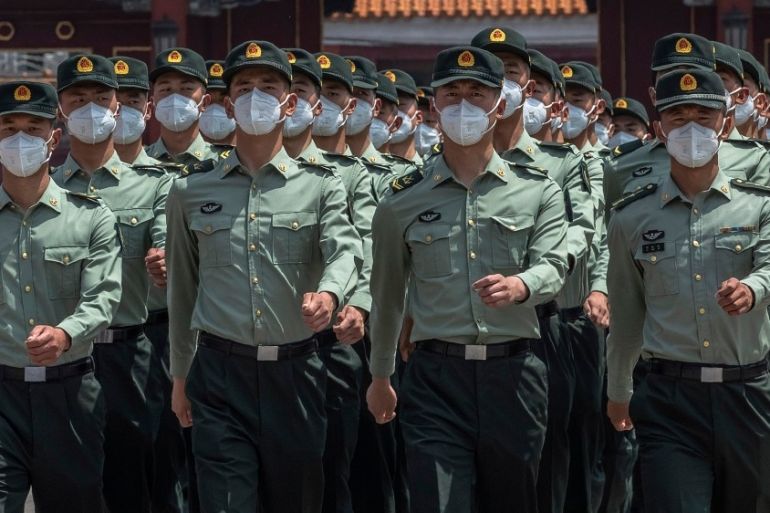China’s top legislators draft details of Hong Kong security law
China and Hong Kong officials insist law won’t affect average people amid criticism of the plan from US, UK and G7.

China’s top legislative body has begun drafting a national security law for Hong Kong that critics say will undermine the semi-autonomous territory’s legal and political institutions.
The bill was submitted to the Standing Committee of the National People’s Congress on Thursday, and covers four categories of crimes: succession, subversion of state power, local terrorist activities and collaborating with foreign or external foreign forces to endanger national security, the official Xinhua News Agency said.
Keep reading
list of 3 itemsHK’s Carrie Lam says security law opponents ‘enemy of the people’
What the new Chinese security law means for Hong Kong
No details on the definitions of those crimes or the applicable punishments were given. It was not clear either whether the law would be passed during the current three-day session of the committee, which is scheduled to end on Saturday.
“With hostile forces in and outside of Hong Kong colluding with each other in recent years, the absence of relevant legal system and enforcement mechanisms on safeguarding national security in the [Hong Kong Special Administrative Region] has created major risks for China’s national security,” Xinhua said in a commentary.
Decision on national security law could be made within this NPC standing committee session (ie Sat), per NPC delegate Ip Kwok-him.
But, there could be further meetings to deliberate on the legislation, he added.
So..it’s a half-baked cake? https://t.co/DrJNPtZVF5
— Alvin Lum (@alvinllum) June 19, 2020
Li Zhanshu, the governing Communist Party’s third-ranking official and head of the National People’s Congress, was presiding over the meeting of the Standing Committee, which handles most legislative tasks in between the annual sessions of the full, and largely ceremonial, congress.
A draft law on safeguarding #NationalSecurity in the #HongKong Special Administrative Region (HKSAR) of the People's Republic of China was submitted to the country's top legislature for deliberation Thursday.https://t.co/ShBulicYkC pic.twitter.com/TkEZK7kRp7
— China SCIO (@chinascio) June 19, 2020
‘Grave concern’
The congress ratified the decision to enact the legislation at the end of its meeting last month.
Under Hong Kong’s Basic Law, its mini-constitution, the territory’s Legislative Council is supposed to introduce a security law, but no administration has tried to do since mass protests in 2003 forced the administration of then-chief executive Tung Chee-hwa to abandon its effort to do so.
Legal experts say Beijing’s justifications for the law are debatable, and critics have said it will destroy the “one country, two systems” principle under which Hong Kong has been governed since its return to China in 1997.
China acted following widespread and sometimes violent pro-democracy protests in the territory last year that began when the administration tried to push through a bill that would have allowed people to be extradited to mainland China for trial. Beijing sees the rallies, which were reignited by the national security legislation, as an attempt to split Hong Kong from the rest of the country.
|
|
The United States has said that of the law is passed it will revoke some of the special privileges it grants to the former British colony. The UK has said it will offer passports and a path to citizenship to as many as three million Hong Kong residents.
On Wednesday, the G7 leading economies expressed its “grave concern” about the legislation stressing that it would breach Beijing’s international commitments as well as the territory’s constitution.
Beijing has denounced the criticism as interference in its internal affairs.
“We urge relevant parties to study the Constitution of the People’s Republic of China and the Hong Kong SAR Basic Law and view the national security legislation in an objective manner,” China Daily cited foreign ministry spokesman Zhao Lijian as saying.
Officials from China and Hong Kong have sought to downplay the dangers of the legislation saying ordinary Hong Kong people will not be affected.
A delegation from Hong Kong led by chief executive Carrie Lam discussed the legislation with the central government earlier this month. The territory’s justice secretary, Teresa Cheng, has said the security law would protect the rights and freedoms of Hong Kong people and strengthen the “one country, two systems” framework.
Taiwan support
Hong Kong activist Joshua Wong said on Thursday that opposing the law “could be my last testimony [while] I am still free.”
“Our long march to democracy will be forced into a prolonged period of crackdown,” he said during an online event to promote democracy and the market economy hosted in Copenhagen, Denmark.
|
|
Taiwan, meanwhile, announced that it would set up an office to provide assistance to Hong Kong people wanting to leave the territory.
The office will provide support to professionals seeking to move to Taiwan, including for school, employment, investment, entrepreneurship and immigration, according to a statement by the Mainland Affairs Council in Taiwan, which handles the island’s relations with Beijing.
Taiwan is a self-ruled island democracy that China sees as its own.
Earlier this month, Hong Kong’s legislature approved a contentious bill making it a crime to insult the Chinese national anthem.
Senior opposition figures have also been arrested for taking part in demonstrations and questions have arisen over whether the national security legislation will be used to disqualify pro-democracy candidates in September’s elections for the Beijing-controlled Legislative Council.